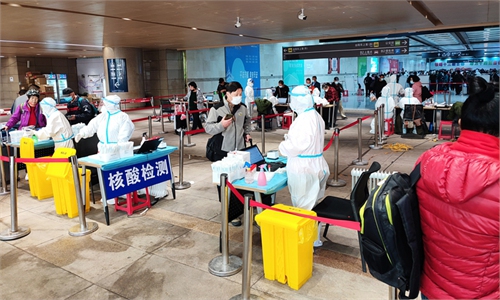
Medical workers and volunteers work on COVID-19 nucleic acid testing in Jiangdu District of Yangzhou, east China's Jiangsu Province, Aug. 6, 2021. Jiangdu District of Yangzhou launched a second round of nucleic acid testing on Friday.Photo:Xinhua
As the US and some European countries head back to "normal lives," travel among most countries across the globe have gradually resumed, China is still sticking to its strict border control measures.
This is because China has adopted a completely different epidemic prevention and control tactic compared with that of most other countries. China believes that nothing is more precious than people's lives. This is why the Communist Party of China has adopted a zero-tolerance strategy of COVID-19. Yet given differences in culture, politics and social governance levels, many countries in Europe and the US have adopted herd immunity and coexistence with the virus strategies.
Over the past year, the results of the two strategies are obvious to all. China, as one of the countries which first saw the outbreak of the virus, was the least affected country. But those, which turned to herd immunity and coexistence with the virus, have paid heavy prices in their lives, health, societies and economies.
However, some believe that European countries and the US will reach their achievements after a bitter process. But China will open its door toward the world sooner or later, and will thus go through the pain which is now experienced by the West.
When will China relax its border controls? Judging from the current situation, as long as the pandemic goes on, China will not do so. If we put economic, social, security, environmental protection and other benefits all into consideration, it is not difficult to find that the advantage of China's continued adherence to strict border control measures will obviously outweigh the disadvantages.
Take a look at tourism industry first. The most direct visible loss to China caused by strict border controls is international tourism revenue. Data shows that foreign tourists spent about $77.1 billion in China in 2019. Strict border controls have reduced this number. However, since many Chinese are unable to travel abroad, the spending of Chinese tourists has dropped as well.
Second, in terms of international trade, China's trade has boomed instead of shrinking. In the first half of 2021, the total value of China's goods trade imports and exports reached 18.07 trillion yuan ($2.79 trillion), an increase of 27.1 percent year on year. The total value of exports expanded 28.1 percent to 9.85 trillion yuan ($1.53 trillion), while imports reached 8.22 trillion yuan ($1.28 trillion), up 25.9 percent.
The facts show that internet has allowed trade to continue online in spite of the strict border controls. While other countries were severely affected by the epidemic, China has benefited from its zero-tolerance policy. It has guaranteed not only the normal functioning of domestic production, but also the global supply chain not to be fully disrupted by the scourge of COVID-19.
Meanwhile, the advantages of China's e-commerce sector have been further highlighted. Under the impact of the novel coronavirus pandemic, the number of consumers shopping at home has sharply increased. China's strength in terms of cross-border e-commerce industry chains has been brought into full play. This has enabled China's economy and trade to make rapid progress in both "to businesses" and "to customers."
China is also doing well in investment. China's outward foreign direct investment in 2020 hit $153.71 billion, increasing 12.3 percent year-on-year and ranking the first place worldwide for the first time ever, according to a report jointly released by China's Ministry of Commerce, the National Bureau of Statistics and the State Administration of Foreign Exchange in September.
Last, the spread of the pandemic proves that the great number of breakthrough infection cases caused by variants of the virus, such as the Delta, have largely dashed our hopes of relying on vaccines to establish herd immunity. As the virus continues to spread and the potential of its mutation keeps to grow, nobody can affirm when the pandemic will end. Moreover, the immunity effect of the vaccine wanes over time. This will mean there is uncertainty whether or not China needs a vaccine booster shot for all its citizens before the country opens its door. Therefore, it is unlikely that China's border controls will loosen as long as the pandemic is not eliminated abroad.
People most affected by China's strict border controls are foreigners who wish to come here to study, work or live. We should provide them with as much convenience as possible under our strict epidemic prevention requirements. We need to study whether there is a scientific and safe prevention mechanism that can allow us to gradually expand the number of people allowed to enter the country. This will be the biggest challenge that China faces in the future in terms of pandemic prevention and border exit and entry control measures.
The author is a research fellow at the Pangoal Institution, a Beijing-based public policy think tank. opinion@globaltimes.com.cn



